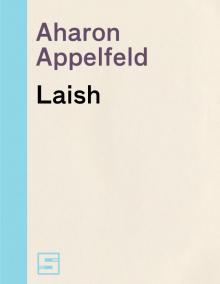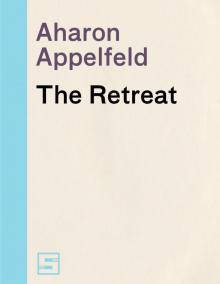- Home
- Aharon Appelfeld
Suddenly, Love Page 3
Suddenly, Love Read online
Page 3
In other houses that he happened to visit, people talked, quarreled, and even shouted. In his house everything was frozen in place. One time his father abandoned his muteness, turned to Ernst, and asked, “Are you studying history?” Ernst was stunned at being addressed. But he recovered and replied, “Certainly, the French Revolution.”
“In the village, we didn’t study history,” said his father, smiling sadly. The grocery store ate up his inner life. It was evident in his hands, in the way he would lay them on the table, or in the way he sat in a chair. Usually he slept on the sofa. That was his place when he returned from the store, and on the Sabbath and holidays. This passivity used to drive Ernst out of his mind. More than once he wanted to stand up and shout, Everything is stifling here!
Ernst felt like a guest in the house, and nothing around him seemed to belong to him. Were it not for the public library and the books he consumed, his life at home would have been a barren desert. He drew his happiness from school. In the race for achievement, he always came in first. His accomplishments provoked wonder, admiration, and of course envy. As early as ninth grade Ernst developed a kind of arrogance. He never expressed his feelings openly, but his behavior proclaimed it: Don’t try to catch up with me; I’m already at the top. In time he brought that pride home. Home was not only darkness and mildew; it was also full of passive ignorance. Sometimes he would erupt, as though to remove a burden from his shoulders, but that was like tramping through stagnant water.
Ernst’s parents demanded nothing of him. On the contrary, it was as if they said, You’re doing too much. Why don’t you sit with us and be quiet. Too much effort is harmful to your health. Though this was never actually stated, it would exasperate him.
Only later on and far from home did Ernst understand that being uprooted from their home in the Carpathian Mountains and settling in the city had made his parents into mute creatures. If anything brought a small suggestion of pleasure to their faces, it was the memory of their parents’ homes in the mountains. Mainly they were sunk in stagnation, and more than once Ernst felt that they were dragging him down with them into an abyss. He would escape from the house and sit in the yard, but the stifling feeling didn’t leave him in the yard, either. He would go as far as the river. Only playing soccer on the riverbank would calm his spirit.
“Ernst!” His father would sometimes emerge from his torpor and address him. Ernst would flinch, pull back a bit, and say, “What do you want from me?”
“Nothing,” came the prompt reply.
Occasionally Ernst’s father would say, as though just remembering, “I met your French teacher, and he’s very pleased with you. When I was in school, they didn’t teach French. We were two Jews in a class of forty peasants.” It was hard to know whether this was resentment or a hidden lament.
“Irena, what did they talk about in your home?” Ernst surprised her again.
“About everything,” she replied, not sensing that this question was freighted with a heavy burden.
For a moment Ernst was about to bring her into his tangled memories, but he drew back. He wrote that night, a great deal. It was nearly morning when, from the scrawled letters, a simple truth, one that had been hidden in his soul for many years, emerged: the reason for his parents’ silence. Now he had to admit that there was some nobility to it. They never complained or assigned blame. It was as if they were saying again and again: Everything is within us and from within us. Our connection with our parents’ faith was severed once we left the village. When we left, we were sure we were doing the very best thing. This is our fate, and it’s no one’s fault. There’s a reason to make a spiritual accounting, but not for recrimination. Our parents delivered all the secrets of faith to us, but we didn’t follow their path.
8
ERNST WONDERS WHY IRENA FASCINATES HIM. SOMETIMES he thinks that she bears within her the serenity of a believer. Indeed, she behaves like a believer. She neither complains nor assigns blame, she finds positive things in people, and sometimes she gives thanks to God. At first her behavior made him feel uncomfortable, but over time Ernst learned that Irena speaks with no ulterior motive or pretense. And her actions are consistent with her speech. But sometimes he thinks that she isn’t intentionally living according to her ancestors’ traditions, that she is just totally filled with wonder about everything that happens to her and everything that happened to her parents and to the grandparents whom she had never known. Ernst likes the expression on her face. He gets the feeling sometimes that she is curious about him. But usually her face reflects what she is doing. Her hands are busy with work, and she doesn’t waste a moment. The house and the furniture gleam. And when everything is in its place, she sits in the kitchen and pickles cucumbers or prepares fruit for drying. When she works, and she works most of the day, rigor and order are her essence.
One evening Ernst surprised Irena by telling her that he was going to write about his childhood. She waited to hear more, her eyes wide with anticipation. Ernst was about to tell her some of what he was feeling, but in the end it proved to be too difficult for him. His childhood and youth weren’t merely a series of errors. There were also, he had to admit, quite a few moments of joy, especially in school. But his parents remained an open wound. During his years at home, he wrote long indictments against them, and after he left home he continued to find fault with them—quite honestly, for no reason. They gave him everything they could. Their own lives were unimportant to them; they asked for nothing for themselves. But he couldn’t forgive them for his unhappy childhood, even after he found out what the Romanian Army had done to them during the war.
During the past few weeks, Ernst has tried desperately to connect with his parents. He sits at his desk for hours and awaits them. For years they had tried to get through to him, but he was either busy at work or concerned with himself, and he didn’t let them in. Sometimes his mother would break through the barrier. His father tried, too. But his efforts didn’t get very far. He would look at Ernst from a distance, as if asking repeatedly, What harm did we do to you that you withdraw from us even now, when we’re in another world? While they were alive, there was no competition between his parents. And if there was, it was minimal. But since they have been trying to approach him from the world beyond, there has been a hidden competition between them. Who will get there first? But the tables have been turned: Ernst is now seeking them.
Ernst’s anticipation of their arrival failed to bring them to him. But images of his childhood materialize from a distance and appear before him. His father lies on the sofa and reads the newspaper. That was his permanent place in the world. Ernst’s mother often said, “Why don’t you lie down in the bedroom? The sofa is narrow.” His father wouldn’t respond, and his mother’s suggestion would be ignored.
Sometimes Ernst’s mother would stand at the window and look out into the night, as though she were expecting someone to come from outside and break the silence in the house. Suddenly she would turn her head toward her husband, seeming to ask for his confirmation. At the time, Ernst didn’t understand that turning of the head. It appeared as if she wanted to voice some reproach. But that notion was, of course, not correct. She never demanded anything.
On Friday evenings Ernst’s mother would light candles. The candles brought no additional light to the house. On the contrary, it seemed to Ernst that the dim light of the white candles was the embodiment of inertia. “Good Sabbath.” His mother’s voice would pass by and touch the stagnant air. Ernst’s father would rise from the sofa and open his eyes wide as if to say, Where is my mistake? There’s no doubt that I made a mistake. But apparently the mistake can’t be corrected. His mother tried in vain to breathe a different spirit into the Sabbath meal. His father would eat two portions of fish. His strange appetite on the Sabbath always repulsed Ernst.
Something else appeared to Ernst recently: his mother’s folding of clean clothes. Every Monday the Ukrainian laundress, a sturdy young woman under whose hands shirts and so
cks were crushed, would come to their house. Her whole being radiated stability, health, and joy. Everything that was missing in their home was present within her. There was a good reason for Ernst to stop reading and watch her. Her name was Galina, and she represented everything he yearned for: a body one could take hold of, full, firm breasts, long legs, rhythmic motions, and laughter. His mother looked like a blighted shadow next to her. Ernst felt bad that he didn’t know how to talk to Galina. His parents’ silence clung to him and seeped into his body, and he stood mute next to her. Still, she left something of herself with him. Every time the scent of starch reached his nostrils, Galina rose up out of the past, as if time had not obliterated her. At night, after returning from the grocery store, his mother would fold the clothing that Galina had washed. It annoyed Ernst that his mother so easily reaped the fruit of Galina’s labor.
Irena resembles Galina slightly: she also has sturdy legs, a full body, and quick hands. When she appears each morning, there is a smile on her face, and Ernst feels like saying to her, Come, let’s live our lives anew. For a moment he forgets the pains that torment him at night and the years that have ill treated him. He’s ready to put on warm clothes and set out.
9
THE COMMUNIST CHAPTER IN ERNST’S LIFE BEGAN WHEN he was twelve. Communist youth from his neighborhood persuaded him to take part in putting up posters at night. The boys were called “poster pasters.” They were fourteen or fifteen years old. Some of them were orphans, but most of them were poor boys who had run away from their families. They squatted in abandoned houses or in empty warehouses where there were no watchmen. They were thin and quick, and their clothing smelled of oil. From them he heard coarse language for the first time.
One night Ernst was caught and put into jail. His father and mother were called, and they hurried to the police station. His mother swore that they were honest people and that their son was an only child. Of course her pleas were useless. The policeman declared that Communists were unworthy of mercy. Their place was in jail.
“He’s a child,” Ernst’s mother implored.
“Even a Communist child is a Communist, and he has to be plucked out before he takes root.”
What pleas failed to accomplish was done by bribery. Ernst’s mother placed a few banknotes in the policeman’s palm, and her son was freed.
The next evening Ernst didn’t report for duty. He was sure that the episode was over, but the following morning his handlers lay in wait for him as he walked to school. If he didn’t report for work that night, they threatened, his blood would be on his own head. You don’t abandon the Party because you’ve been arrested once, they said.
“I’m afraid,” he blurted out.
“You’re afraid of the Romanian police? You ought to be afraid of Stalin instead!”
Ernst encountered those violent boys almost every day. He tried to run away from them, but they were faster than he was. If they didn’t catch him by day, they ambushed him at night. Once, in the middle of the night, they banged on his window and shouted, “Traitor! Traitors won’t be forgiven!”
In the end Ernst couldn’t resist the pressure and returned to his handlers. They didn’t greet him fondly. They kept reminding him that the Party doesn’t tolerate shirkers and deserters.
His parents suspected that his disappearances at night weren’t of an innocent nature, but they were immersed in the store and in debts, and they didn’t ask a lot of questions. Ernst became more deeply involved in the Party. One night he was taught how to break open doors and prepare flammable materials. Before long he took part in burning down one of the smaller yeshivas. Burning down religious institutions was regarded as one of the Party’s important imperatives. All the boys took part. At first Ernst hesitated, but he became increasingly captivated by their rigor.
One night he witnessed the interrogation of an elderly rabbi who lived on the outskirts of the city. The boys entered his apartment without knocking. The rabbi was sitting at his desk, reading a book. The head of the gang addressed him in Ukrainian. “Rabbi,” he said. The rabbi raised his head up from the book.
“We came to warn you.” The boy spoke directly to the rabbi. “You’d better not teach boys Talmud anymore.”
“I don’t understand.” The old man sat up straight in his chair.
“We came to warn you not to teach the Talmud. The Talmud is full of superstitions. Spreading damaging beliefs is like spreading poison.”
“Poison?” The rabbi looked sharply at him.
“Indeed.”
“These teachings are meant only for Jews.” The old man spoke softly.
“I know. What difference does that make? Poison is poison, and it’s poisonous.”
“I’ve been teaching for fifty years.” The rabbi spoke as if the person before him wasn’t an intruder but an accuser who had come to complain about his legal decisions.
“You’ve been spreading poison for fifty years. The time has come to stop. The Party doesn’t mince words. If its demands aren’t met, it has ways of putting the one who refuses in his place.”
A smile spread across the rabbi’s face. “I’m seventy-one years old,” he said. “A man at my age isn’t afraid anymore.”
“You’re wrong. Fear isn’t connected to age. The Party has the power to impose its authority on everyone.”
“I see that the Party is omnipotent,” the rabbi replied, not without a hint of irony.
“Correct. I wouldn’t suggest testing its strength. You’d be better off, for your own good, accepting the Party’s dictates without provoking it.”
“What’s wrong with studying Talmud?” The rabbi reverted to his old argument.
“Didn’t I explain it to you? You yourself know that the Talmud is full of superstitions and benighted laws, not to mention magic. A person who devotes himself to Talmud study eventually becomes a fanatic and an exploiter, oppressing women and children. Those poisonous plants must be rooted out.”
“Who are you?” asked the rabbi, as though roused from a nightmare. He placed his pale hands on the table.
“That’s not important. This is not a personal matter. You have to stop this harmful hypnosis once and for all.” It was evident that the young interrogator had a good bit of talent for speaking. During the conversation, he had used the word “theology” several times, and a few other words that Ernst didn’t understand.
The old rabbi rose to his feet and said, “This is our holy Torah, and we are willing to give our lives for it.”
“We’ve already heard that stupid argument, and it doesn’t deter us.”
“Get out of my house!” The rabbi could no longer control himself.
“You’ve crossed the line.” The interrogator changed his tone. “The Party won’t forgive a sin like that. Until now you were a public nuisance; from now on you’ll be seen as an adversary. Adversaries are judged more harshly.”
“Get out of here. Get out!” The rabbi spoke as if the interrogator weren’t threatening but was just annoying.
“I could have eliminated you easily,” said the boy, pointing to the revolver in his belt. “I won’t do it, because the Party allows for repentance and for begging pardon. I’m giving you a week’s reprieve.”
The old man opened his eyes wide, as if the person talking to him were an evil spirit.
“I advise you to think carefully about what I said to you,” said the boy, as he and his two associates turned to the door.
Ernst was increasingly captivated by all these goings-on and became more deeply entrenched within the Party. The thought that he was freeing people from the prison of religion inspired him with the will to act. There was no limit to his devotion, to his obedience. Ernst believed that self-sacrifice was the highest expression of humanity.
10
ERNST WRITES EVERY DAY. AFTER THREE HOURS HE FEELS weak all over. He hadn’t written about his own life in years past but about the lives of others. He believed that cutting himself off from his personal experiences was
necessary for accurate and truthful writing, just as it was important to sever himself from Jewish tribalism. Jewish tribalism felt like an oppressive anachronism to him.
From time to time Ernst reads a passage or a chapter to Irena. When he reads to her she lowers her head as though trying to absorb his words with all her might. This time she couldn’t contain herself and said, “It’s forbidden to set fire to yeshivas and synagogues.”
“But at that time people believed that this would bring salvation to humanity, including the Jews.” Ernst tried to put things in their historical context.
When Irena disagrees with Ernst, she closes her eyes and her body trembles. Finding words to express her feelings is not easy for her. A day or two might pass before she can draw out a few sentences. When she finally does, they always surprise Ernst with their simplicity and seriousness. Sometimes she utters a sentence she has already said. It’s impossible for Ernst to argue with Irena because, among other things, she doesn’t stand up for her opinions. He has often tried to draw her into an argument, but all his efforts have been in vain.
Irena is not like other women. He learns this anew each day. There is a kind of solid innocence about her that one cannot easily shake. “My neighbor, Mrs. Grossman, invited me to dinner,” she told him this morning. “She can hardly walk, but she hasn’t forgotten the day my mother died. ‘Everyone is an orphan on the day of their mother’s death, even if they’re fifty years old,’ she told me. That’s right, isn’t it?”
Irena’s “isn’t it?” is part of her charm.
Irena always finds something good in everyone, even in the neighbors who weren’t friendly to her parents. It’s apparently hard for her to be angry. For example, she doesn’t understand why some people hate those who pray.

 Long Summer Nights
Long Summer Nights Tzili
Tzili The Conversion
The Conversion The Iron Tracks
The Iron Tracks All Whom I Have Loved
All Whom I Have Loved Laish
Laish The Retreat
The Retreat Unto the Soul
Unto the Soul Blooms of Darkness
Blooms of Darkness The Man Who Never Stopped Sleeping
The Man Who Never Stopped Sleeping Katerina
Katerina Until the Dawn's Light
Until the Dawn's Light Adam and Thomas
Adam and Thomas Suddenly, Love
Suddenly, Love